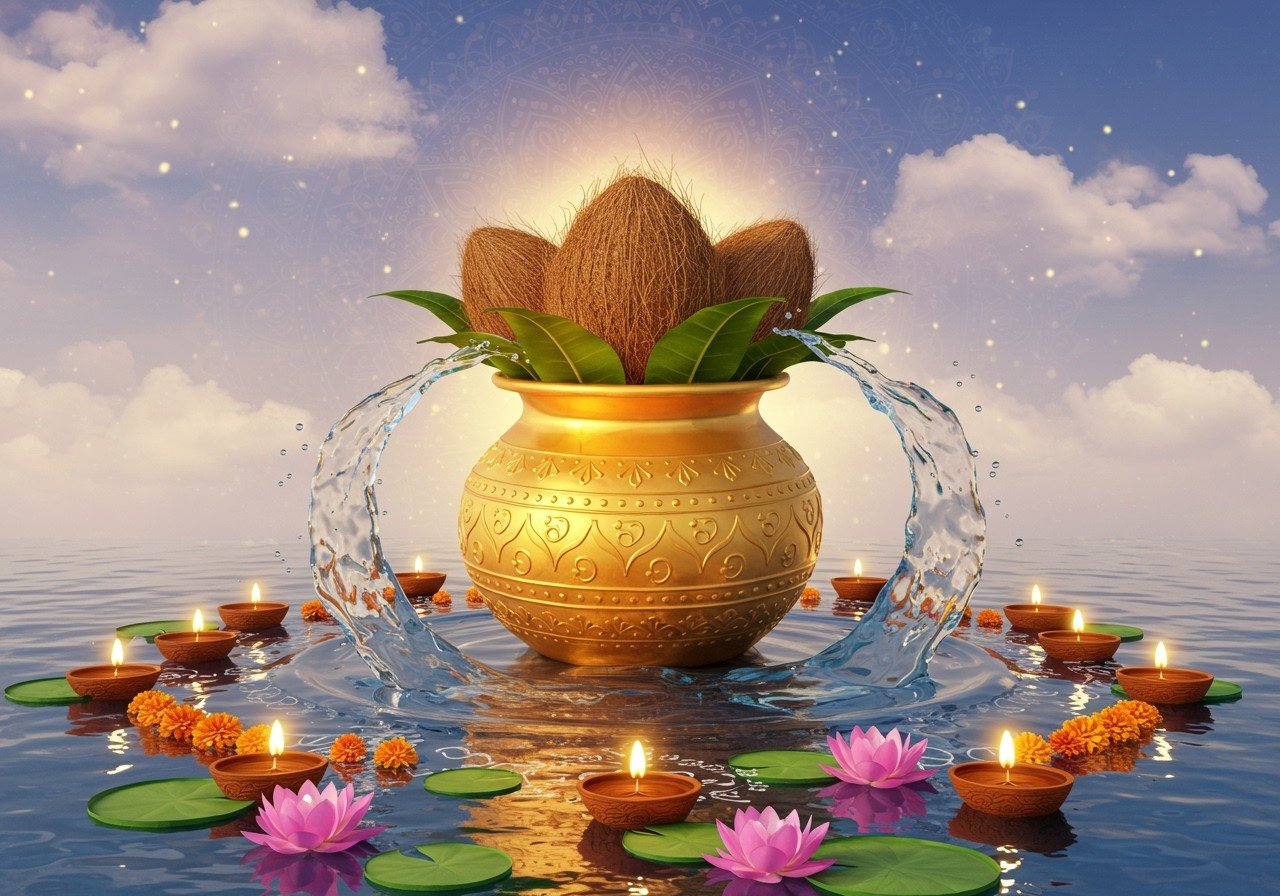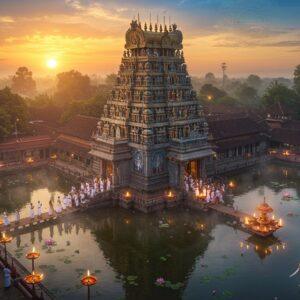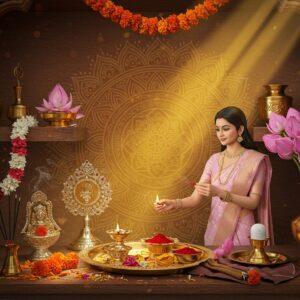
Namaste. Welcome to this exploration of the Kalash, a deeply revered symbol in Hindu culture. This blog post delves into the rich significance of the Kalash, exploring its traditional meanings, components, and its important role in various rituals. We’ll uncover the reasons why it holds such a special place in Hindu homes, particularly for those of us who deeply value our traditions.
Deciphering the Symbolism of the Kalash
The Kalash, often referred to as a Purna-Kalasha, Purna-Kumbha, or Purna-Ghaṭa, is much more than just a vessel. It embodies a wealth of symbolic meanings, representing prosperity, abundance, spiritual purity, wisdom, and even immortality. Imagine it as a vessel overflowing with blessings, echoing the generosity of Goddess Lakshmi, the embodiment of wealth and prosperity. It’s a potent symbol of the divine energy that nourishes and sustains life.
Traditionally filled with water, the Kalash represents the primordial waters of creation, symbolizing the very source of life. Fresh mango leaves, adorning its mouth, signify continued prosperity, echoing the vibrant continuity of life itself. The coconut placed on top, often encased in a red cloth, represents the Sahasrara chakra, our connection to the divine consciousness. Finally, the sacred thread, or kalawa, tied around the Kalash acts as a protective shield against negative energies, ensuring purity and sanctity.
This sacred object plays a pivotal role in a wide range of Hindu ceremonies, from weddings and housewarmings to pujas and festivals. Its presence signifies auspicious beginnings, blessings, and the invocation of positive energies. More than just a decorative element, the Kalash is a powerful symbol, deeply intertwined with our spiritual heritage.
Browse our exquisite collection of Kalash at Poojn.in.
The Elements of the Kalash: A Deeper Dive
Each component of the Kalash contributes to its rich symbolism. The pot itself, often made of copper or brass, is chosen for its ability to attract and channel positive vibrations. These metals are considered pure and conducive to spiritual practices.
-
The Pot: Symbolic of Mother Earth and the womb, the pot represents fertility, the material world, and the nurturing aspect of creation. It is the foundation of the Kalash, grounding its spiritual significance.
-
The Water: Representing the life-giving force of nature and divine energy, the water within the Kalash is often sanctified with Ganga Jal, further enhancing its purity. It symbolizes the very essence of life, cleansing and revitalizing.
-
Mango Leaves: These vibrant leaves symbolize the five elements – earth, water, fire, air, and ether – essential for the balance of life. They are also associated with Kamadeva, the god of love, representing the joyous aspect of creation and fertility.
-
The Coconut: Placed atop the Kalash, the coconut, often draped in red cloth, signifies prosperity, power, and the Sahasrara chakra, the crown chakra, which connects us to divine consciousness.
-
The Sacred Thread (Kalawa): Tied around the Kalash, this thread acts as a protective barrier, warding off negative influences and ensuring the sanctity of the vessel. Its red or yellow hues symbolize purity and auspiciousness.
Regional variations across India add further layers of meaning to the Kalash, showcasing the diversity and richness of our cultural heritage. Each variation tells a unique story, reflecting the local traditions and beliefs.
The Kalash in Our Rituals and Ceremonies
The Kalash plays a central role in various Hindu rituals, each with its unique significance:
-
Weddings: The Kalash symbolizes blessings for a harmonious and prosperous married life. It represents the beginning of a new journey, filled with hope and auspiciousness. The North-facing placement invites good fortune and positive energy. Find the perfect Kalash for your wedding ceremony at Poojn.in.
-
Housewarmings (Griha Pravesh): Placed at the entrance, the Kalash welcomes positive energies into the new home, creating a sacred and protected space for the family. It acts as a guardian against negativity, ensuring a blessed beginning. Explore our Poojn.in collection of Kalash sets perfect for housewarming ceremonies.
-
Navratri: During Navratri, the Kalash is often seen as an embodiment of the Divine Mother, representing strength, nourishment, and protection. It is worshipped with utmost reverence, signifying the feminine principle of creation.
-
Ganesh Puja: The Kalash plays an essential role in the installation of Lord Ganesha’s idol, symbolizing life and fertility. This connects the ceremony to agricultural and harvest traditions, highlighting the importance of abundance and prosperity.
The Kalash in the Modern World
The Kalash seamlessly blends tradition with modernity. Many homes proudly display it as a decorative item, a constant reminder of our cultural heritage and spiritual values. It serves as a beautiful bridge between the past and the present.
Online platforms like Poojn.in have made it incredibly convenient to acquire authentic Kalash and related items. This allows us to maintain the sanctity of our traditions while embracing the convenience of modern life. Poojn.in offers a wide selection of high-quality Kalash and puja essentials, ensuring authenticity and purity for your rituals.
Embracing the Timeless Tradition
The Kalash is a powerful symbol, embodying the essence of Hindu culture and spirituality. It connects us to our roots, reminding us of the values and traditions that shape our lives. Its presence, whether in a ritual setting or as a decorative element, brings a sense of peace, prosperity, and continuity. Poojn.in makes it easy to incorporate this timeless symbol into your life, offering a wide range of authentic Kalash and puja items.
You can Enhance your puja experience with authentic Hawan Samagri from Poojn.in. Our curated collection of Kalash, Hawan Samagri, and other essential puja items are designed to elevate your spiritual practices.
Frequently Asked Questions about the Kalash
What is the meaning of the Kalash? The Kalash represents the universe, abundance, wisdom, immortality, and the divine presence. It is a potent symbol of prosperity and purity in Hindu rituals.
What are the essential components of a Kalash? A Kalash typically includes a pot (often made of metal or clay), water, mango leaves, a coconut, and a sacred thread (kalawa). Each element holds its own spiritual significance.
Why is water an important part of the Kalash? Water symbolizes life, purity, and the primordial source of creation. It is believed to purify the environment and invite positive energy during rituals.
What is the significance of the mango leaves on the Kalash? Mango leaves represent fertility, well-being, the five elements, and are associated with Kamadeva, the god of love. They are believed to ward off negativity and invite prosperity.
Why is a coconut placed on top of the Kalash? The coconut symbolizes the head of the deity, life, fertility, and is considered highly auspicious. It is believed to fulfill desires and bring good fortune. Enhance your Kalash with our premium coconuts available at Poojn.in.
Is the Kalash used in all Hindu rituals? The Kalash is a versatile symbol used in a wide range of Hindu rituals, including housewarmings, weddings, and various other auspicious occasions, to invoke divine blessings.
What does the pot of the Kalash represent? The pot symbolizes Mother Earth, fertility, the womb, and acts as a vessel for containing divine energy.
Does the Kalash pot have to be made of metal? Traditionally, metal pots (copper or brass) are preferred, but clay pots can also be used based on the specific ritual and personal preferences. Poojn.in offers a diverse collection of both metal and clay Kalash to suit your needs.
Where should I place the Kalash in my home? The placement of the Kalash can vary depending on the specific ritual or tradition being followed. For instance, it is often placed at the entrance during housewarmings or facing the North for general prosperity.
Which deities are associated with the Kalash? The Kalash is associated with several deities, including Lord Brahma, Lord Shiva, Goddess Lakshmi, and is even considered by some to be a personification of Lord Ganesha.
Order your Kalash Kumkum and Roli today from Poojn.in.


